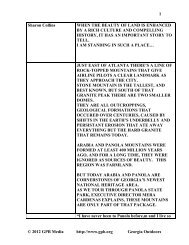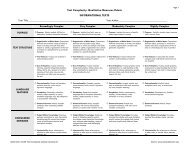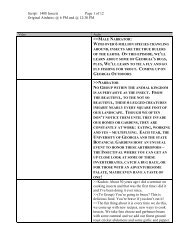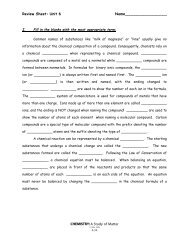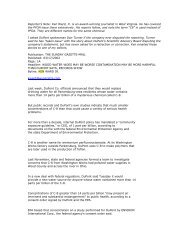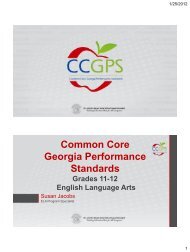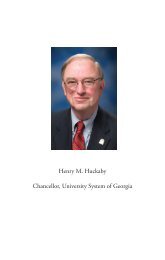Download the Q & A transcript (PDF) - Georgia Public Broadcasting
Download the Q & A transcript (PDF) - Georgia Public Broadcasting
Download the Q & A transcript (PDF) - Georgia Public Broadcasting
You also want an ePaper? Increase the reach of your titles
YUMPU automatically turns print PDFs into web optimized ePapers that Google loves.
<strong>Georgia</strong>’s BusinessEnterprising Entrepreneurs EditionDavid PetersonQUESTION AND ANSWERS TRANSCRIPTMUSICRichard Warner:Welcome we just finished taping <strong>Georgia</strong>'s Business here on <strong>Georgia</strong> <strong>Public</strong> <strong>Broadcasting</strong>. I'mRichard Warner. This is our version of After <strong>the</strong> Show entirely unrehearsed and spontaneouswith our guest Dave Peterson who's chairman of <strong>the</strong> North Highland Company. Joining us in <strong>the</strong>audience are students from <strong>the</strong> J. Mack Robinson College of Business at <strong>Georgia</strong> StateUniversity. And I thought you did well.Dave Peterson:Thank you it was fun.Richard Warner:Half hour went by pretty fast.Dave Peterson:Very fast...Richard Warner:Didn't lose anybody…alright we'll see how this goes now. These are <strong>the</strong> unscripted, unrehearsedquestions from students at <strong>the</strong> Robinson College. And yes sir you're up first go right ahead.Question 1:Great well thanks for your time Dave. You're in such a people intensive business. I would love tohear in terms of recruiting when you're looking to hire people, apart from work experience whatcharacteristics are you looking for? And <strong>the</strong>n number 2 in that interview process how do you pullthose characteristics out of those individuals?Dave Peterson:Well we do look for experience and we average about 15 years experience. So people comingout of <strong>the</strong> big firms, people coming from big corporations with that kind of experience gets usinterested. But it really is about those personal traits, <strong>the</strong>ir behaviors, <strong>the</strong>ir desire to assistcompanies that <strong>the</strong> interview process really gets to <strong>the</strong> heart of. So <strong>the</strong>y typically will run througha stress day where <strong>the</strong>y're brought in and <strong>the</strong>y meet anywhere from 6 to 8 existing consultants.We ask <strong>the</strong>m a series of questions about <strong>the</strong>ir experience about some of <strong>the</strong> issues <strong>the</strong>y've facedtrying to understand how <strong>the</strong>y would fit in with our clients and in with our culture. And at <strong>the</strong> endit's ei<strong>the</strong>r a pretty clear fit or it's probably not going to work for us. It doesn't mean <strong>the</strong>y're nottalented but we think it's important also to maintain our culture. And that's kind of <strong>the</strong> core of whowe're trying to be long term.Question 1:ThanksRichard Warner:Bill Gates said that he made more mistakes in that area <strong>the</strong>n in any o<strong>the</strong>r in his career. What'syour batting average? Have you hired people that you thought would be home runs and weren't?Or people who turned out to be home runs you never were really sure <strong>the</strong>y would?1
Dave Peterson:We've had more of <strong>the</strong> latter. Again a lot of our good solid performers have turned out to be inour term rock stars. But we have a different definition of a rock star. They don't require a lot of acare and feeding. It's not about <strong>the</strong>m it's about <strong>the</strong>ir team. And so suddenly those folks that get itreally are <strong>the</strong> star performers in our company. We've had some hiring mistakes. You know in apeople business you're going to make some mistakes. And a lot of our issues are people relatedbut you can't stop doing that, growth requires <strong>the</strong> right people so we keep looking for <strong>the</strong>m. Andwhen <strong>the</strong> mistakes happen we hope <strong>the</strong>y'll be successful somewhere else.Richard Warner:Yes sir go ahead.Question 2:My name is David Schusterman and as a former 100% travel consultant I can really appreciatehow much of a difference <strong>the</strong> local consulting must make. But I wanted to ask you mentionedearlier that your government experience translated well into pulling in corporate clients. Howmuch push did that take? How much time did it take to make <strong>the</strong> transition to start really pullingin corporate clients?Dave Peterson:Well <strong>the</strong> government client was our first but we had a corporate client you know <strong>the</strong> next week.So it goes hand in hand. I think if you do good work for your clients and can build up a lot ofreferences than whe<strong>the</strong>r <strong>the</strong>y're government sector, non-profit sector, corporate clients, you'vegot you know bragging rights that you can say you did a good job. And ultimately that's whatcompanies and government agencies are looking for, consulting companies that will get <strong>the</strong> workdone according to <strong>the</strong>ir rules. So we're very sensitive to how different companies react indifferent ways in <strong>the</strong> market place.Question 2:Thank you.Richard Warner:Fill in <strong>the</strong> blank; never underestimate <strong>the</strong> importance of...Dave Peterson:Culture, we have a good consulting project and can probably be summarized in what is called aclassic two by two matrix. If you're in <strong>the</strong> business school you understand. You got onedimension high or low and ano<strong>the</strong>r dimension high or low and <strong>the</strong>n how do you organize <strong>the</strong> datain that two by two matrix. What we've discovered is that that works for employees too. You canhave skills, high skill, low skill, and you can have cultural fit, high or low. A person with high skillsand low cultural fit is not someone you want to have long term and we don't want to have long<strong>the</strong>m. So you can build skills. It's hard to fix culture. So we're really sensitive to culture in <strong>the</strong>organization.Richard Warner:Go right ahead.Question 3:Thank you very much. My name is Dai Guna and I'm interested in finding when you study <strong>the</strong>business you had a lot of things to consider and my particular interest is in default like you getstarted and all <strong>the</strong> loans that you started off you can't pay <strong>the</strong>m anymore. How did you do it?How did you plan to do hedging <strong>the</strong> risk that I'm going to start this business and it's going to takeoff?Dave Peterson:2
ecause knowing exactly how you will get paid by whom is one of <strong>the</strong> key questions that I think agood entrepreneur's got to ask.Richard Warner:Did you know from an early age you were going to be an entrepreneur or were you built?Dave Peterson:Well according to Meyer's Briggs I'm a natural consultant for those of you who are studyingpeople. And I like to give advice. There's a saying in our business, it's easy to consult, it's hardto get paid to consult. So I've been a consultant for many many many years and finally havestarted getting paid for it if you will. Yes sir?Question 5:Hi my name is Keith Williams. You started <strong>the</strong> business out of your home...Dave Peterson:Yup.Question 5:At what point in that first year, it's a very critical year for any new business, at what point did youfeel you had justification or you felt like you had <strong>the</strong> ability to go and move into a building andreally take <strong>the</strong> business to <strong>the</strong> next level?Dave Peterson:We were working on a proposal I believe it was for <strong>the</strong> city of Atlanta and we decided at that timethat <strong>the</strong> team we needed was larger than just our employees. We would have to reach out andbring on some additional affiliates, contractors for us. And we felt that Bob's basement or my attictoo small to meet on a regular basis and so that said well why don't we find a space. Well onceyou commit to a space well now you also have to have furniture and <strong>the</strong>n you have to have aphone system. And so <strong>the</strong>re's kind of this cascading series of expenditures and investments that<strong>the</strong>n proceeded to happen. We made, again we're funding it ourselves so it was modest, frugal isa word we use frequently. The furniture was used. There was a company that was goingbankrupt. We bought all <strong>the</strong>ir furniture. We got a good deal, seven dollars a square foot inAtlanta.Richard Warner:ManDave Peterson:Yea we don't pay that anymore. So you know it wasn't an expense but it was one of those thingswe felt that we needed to do it for <strong>the</strong> company, set <strong>the</strong> right image and that really to have a placewhere we could meet as a group instead of in <strong>the</strong> attic.Question 5:Thank youRichard Warner:Frugality you know that probably disserves a follow up question because many companies,promising companies have been torpedoed because <strong>the</strong>y started to get a taste of cash flow and<strong>the</strong>n decided to spend it.Dave Peterson:I think <strong>the</strong>re's a very well known company who will remain nameless that went public took all thatmoney plowed it into furniture and <strong>the</strong>n went belly up six months later. I think you've got to bevery careful with cash. There's a very famous saying from <strong>the</strong> former head of Fuqua here, cashain't cash until it's cash. And you've got to recognize that cash goes out very very fast. It doesn't4
come in quite as easily. And so given that it was our cash we knew how we wanted to spend it.And it was putting in good investments not putting in <strong>the</strong> frills. So we still are pretty frugal. Youknow <strong>the</strong> North Highland Company stems from <strong>the</strong> Scottish <strong>the</strong>me. I'm half Scotch and I hadUncles that were in <strong>the</strong> black watch, <strong>the</strong> world highland's regiment. And a Scotchman is notcheap, he's thrifty. He has short arms and deep pockets. And so we don't always grab for <strong>the</strong> bill<strong>the</strong> first go around.Richard Warner:Ok, go ahead.Question 6:Hey my name is Ray Shin. And you said earlier that you try to look for fine good workers, right.So say that you were an employee for like around like ten years, stayed with you for a long time.What if that employee's family member wanted to get into <strong>the</strong> firm?Dave Peterson:We really like our employees. They're <strong>the</strong> owners of <strong>the</strong> company. We've had, we just had acelebration, we have a number of employees that just had <strong>the</strong>ir tenth year anniversary. We havethis philosophy, it's our policy, it's not what every company does that spouses and bro<strong>the</strong>rs andsisters and children will not work in our company. We have a number of couples that work for us,one is an employee, one is a contractor. We've just made that made that part work. So again it'sa philosophy we have. It's not <strong>the</strong> right thing for all companies. So you've got to decided what'simportant to you. So our families made up of like I said many different people with differentsurnames. There is ano<strong>the</strong>r David Peterson in our company. We call him Junior but he's norelationship to me. And he occasionally gets this call that was meant for me. And he does it ingood stride passes it along.Richard Warner:So just send <strong>the</strong> check to this address.Dave Peterson:That's right. That's exactly right.Question 6:So my question is, so <strong>the</strong> employee has been working for your company for quite a while and youtrust <strong>the</strong>m and say <strong>the</strong>ir family member is pretty trust worthy you know, isn't that kind of likefinding a good worker through a relation of ano<strong>the</strong>r person?Dave Peterson:Yea, we just decided again against that. Being a small company <strong>the</strong>re are challenges whenfamily members work toge<strong>the</strong>r and we've said it's easier, now <strong>the</strong>re's a choral area. We've had afew of <strong>the</strong>se is suddenly <strong>the</strong>y're dating and <strong>the</strong>y marry and one of <strong>the</strong>m has had to leave. And sothat's a tough situation. We hope it's you know <strong>the</strong>y can work it out because we're not going tomake that decision. But that's happened in several circumstances.Richard Warner:I married my wife, it came time you know for one of us to leave and she left and my boss wasdisappointed about that.Dave Peterson:Wrong one huh.Richard Warner:Appreciate your question...Dave Peterson:5
Thank you...Richard Warner:Compensation...Dave Peterson:Yea...Richard Warner:You know in a law firm you kill it, you eat it. Is that <strong>the</strong> way you're structured?Dave Peterson:No. We have a very different compensation formula. We pay less than market. And peoplecome on board and we have to explain that to <strong>the</strong>m. We call it <strong>the</strong> North Highland haircut that<strong>the</strong>y come out of a big firm <strong>the</strong>y're used to making <strong>the</strong>se very large numbers and we don't paythat. We pay a smaller base. We've got to explain it to <strong>the</strong>m. Well part of it is <strong>the</strong>y get off <strong>the</strong>road. So <strong>the</strong>re's some tangible value. But part of it goes back to our philosophy of service andwe have a variable comp mechanism that actually can pay more than <strong>the</strong> standard firms pay but<strong>the</strong>y've got to earn it.Richard Warner:How do <strong>the</strong>y do that?Dave Peterson:Well <strong>the</strong>re's a variety of different ways to earn it in our company. Some are just if you will <strong>the</strong>classic billable hour that <strong>the</strong>y're working at a client and <strong>the</strong> more hours bill, see <strong>the</strong>re's a selfregulator on that one because <strong>the</strong> clients are only going to pay so much so you can't you knowrun up fees without if you will results. We have o<strong>the</strong>r mechanisms to ei<strong>the</strong>r find business or to bea thought leader or to be involved in teaming with o<strong>the</strong>r people. So based up <strong>the</strong> formula <strong>the</strong>re'sa variety of programs that people can make <strong>the</strong> variable comp. So you add it all up and it'scomparable to <strong>the</strong> big firms. What we're seeing in consulting used to be <strong>the</strong> consultants didbetter than <strong>the</strong>ir corporate peers, <strong>the</strong> consulting industry has been pressed down by offshore by<strong>the</strong> number of competitors so we're now seeing some of our people go to our clients becauseclients pay better. And that was unheard of ten years ago in <strong>the</strong> consulting business.Richard Warner:That's ok?Dave Peterson:Well we know <strong>the</strong>y're going to a good company. We hope <strong>the</strong>y'll be a friend of ours once <strong>the</strong>y're<strong>the</strong>re. So we hate to see <strong>the</strong>m go but <strong>the</strong>re's some things you just can't do. We've got a youknow comp system that we have to stick with. So if <strong>the</strong>y get a better deal we wish <strong>the</strong>m well.Question 7:My name is Jude Mark. I have two questions. The first one is what resistance if any did youcome across when deciding to form an ESOP and how did you deal with it?Dave Peterson:I think <strong>the</strong> biggest resistance came from lack of understanding. It's complicated and so we triedto explain it to our employees what it is. It's not something that many people have encountered.They're familiar with public companies. They're aware of stock options. They're not familiar withhow a private company does financing. And so this is a vehicle that we have to explain. Sowe've hired an ESOP consultant who comes in and explains it to our people. And <strong>the</strong>n you haveagain as I mentioned <strong>the</strong> various service providers. You've got a separate accountant, aseparate lawyer, <strong>the</strong> evaluation firm, you have an ESOP trustee, you have an administrator. Youknow so that's <strong>the</strong> downside and it is you pay for those services. And for <strong>the</strong> entrepreneur who6
wants to have control by definition <strong>the</strong>y're giving up control. But for our business for <strong>the</strong>professional service people that we have it's <strong>the</strong> right thing to do because <strong>the</strong>y're mobile, <strong>the</strong>ycould go anywhere. This if you will gives <strong>the</strong>m <strong>the</strong>ir own company. It locks <strong>the</strong>m into <strong>the</strong> growthand equity if <strong>the</strong> company continues to do well.Richard Warner:Does that mean North Highland will never be sold?Dave Peterson:Never say never but to sell <strong>the</strong> company now we would have to have in effect an employee vote.And I don't know it would have to it would depend.Richard Warner:It depends.Dave Peterson:The plan is not to sell. You never ask <strong>the</strong> question. One of <strong>the</strong> things I had a chance to do a fewyears ago is to develop a hundred year plan. Again I tell you I'm lousy in planning. When I firstgot this assignment I realized you know I put it off because I thought oh man more numbers whowants to build a hundred year spreadsheet. And after several months of carrying around this littleworkbook from an advisor, I finally opened it up and laughed because it had nothing to do withfinancials. It really is about creating <strong>the</strong> kind of company culture vision if you will that sustainsitself because you can't really project that far out. You know we do an annual forecast and at <strong>the</strong>end of <strong>the</strong> year we ei<strong>the</strong>r lucky or lousy. We met <strong>the</strong> number we didn't make <strong>the</strong> number. So fora hundred years it's about something bigger than financials.Richard Warner:Yes ma'am.Question 8:Hi I'm Joan Shoemaker and I am not a student at <strong>Georgia</strong> State University but I am a graduate of<strong>Georgia</strong> State. I am a business owner and one question I have is that you had mentioned Mr.Peterson that it takes about a year for you to be able to train a consultant before <strong>the</strong>y're reallyproductive. So what are some of your strategies that you use to be able to bring that consultantup to speed?Dave Peterson:Well I may have misspoke. They're productive with <strong>the</strong>ir skill when <strong>the</strong>y walk in <strong>the</strong> door. We'rehiring for skill. They're experienced people. It takes about a year for <strong>the</strong>m to I guess <strong>the</strong> word isbe inculcated where <strong>the</strong>y understand <strong>the</strong> culture that we're trying to create so that <strong>the</strong>y can <strong>the</strong>nown it <strong>the</strong>mselves which we find requires a lot less management effort than if someone doesn'town it and <strong>the</strong>y require to be managed. So it's a process we take experienced people through.Again <strong>the</strong>y're early, <strong>the</strong>y're productive from <strong>the</strong> very beginning but it's <strong>the</strong> nuances of <strong>the</strong>business because we're trying to be a different kind of consulting company. We've got to make itfeel different first to our employees so <strong>the</strong>n <strong>the</strong>y make it feel different to our clients.Richard Warner:Vender neutral, two words we did not touch.Dave Peterson:Ah, yes. Well many consulting firms align <strong>the</strong>mselves with large providers of software or forms oftechnology or o<strong>the</strong>r partnerships and we've decided to be independent. So that's a philosophywe have. It <strong>the</strong>n goes back to how we <strong>the</strong>n fulfill our service offerings. So many cases we'rehired by large corporations to go help <strong>the</strong>m pick software or to go evaluate ano<strong>the</strong>r consultingcompany because <strong>the</strong>y know we're independent and not biased by that relationship with those7
o<strong>the</strong>r partners and so <strong>the</strong>y can get a you know independent and honest and fair view of what willmake <strong>the</strong>m successful.Richard Warner:One last question, yes sir.Question 9:Thanks, I'm Carl Stukey. I'm on <strong>the</strong> faculty of <strong>the</strong> computer information systems department.Dave has been a great supporter of our programs in <strong>the</strong> past so first I should have to say thankyou very much. And a commercial I should say we're in <strong>the</strong> top ten both in our graduate andundergraduate program. So we look forwarded to seeing additional great students andsupporters like Dave. And <strong>the</strong>re really is a question here. And that question is we see a lot morediscussion about virtual environments and you talked about people not really enjoying travelingthat much necessarily although some do. Do you think <strong>the</strong>re's an opportunity for virtualcollaboration to take on part of <strong>the</strong> role of travel in consultancy?Dave Peterson:Absolutely. You know if you think about how business is performed <strong>the</strong>re are very manyelements that are physical and virtual. And virtual uses <strong>the</strong> various forms of technology,telecommunications, computers, collaborative tools and things like that. But at some level <strong>the</strong>re'snot escaping <strong>the</strong> need for physical, <strong>the</strong> face to face interaction. And so <strong>the</strong> challenge is at whatlevel do you mix and match those two ingredients if you will. And again it depends; somecompanies are very comfortable with distributing, collaborative work being done on <strong>the</strong> field.Some companies are not. And so again our business requires us to understand each client'sstrategy, <strong>the</strong>ir culture, <strong>the</strong>ir philosophy and adapt ourselves to <strong>the</strong>m. And if <strong>the</strong>y're veryphysically oriented we're going to be <strong>the</strong>re. If <strong>the</strong>y're comfortable with a virtual team <strong>the</strong>n we'regoing to do as much as that as we can but we've got to do both at some mixture if you will.Question 9:Thanks very much.Richard Warner:And that's our version of after <strong>the</strong> show with Dave Peterson <strong>the</strong> chairman of North Highland.Thanks for being with us and we'll see you next time. Thank you very much.8
This document was created with Win2<strong>PDF</strong> available at http://www.daneprairie.com.The unregistered version of Win2<strong>PDF</strong> is for evaluation or non-commercial use only.



